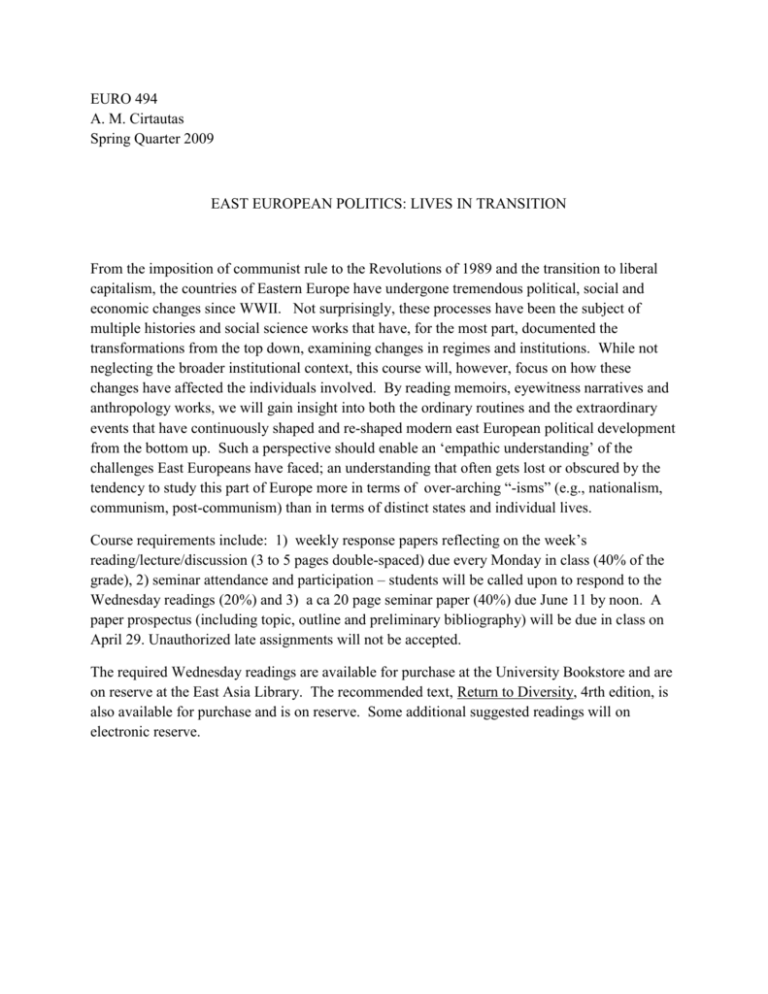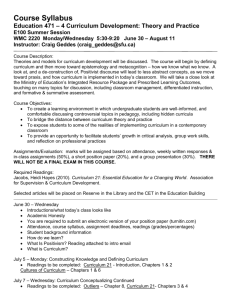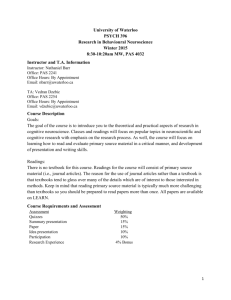EURO 494 A
advertisement

EURO 494 A. M. Cirtautas Spring Quarter 2009 EAST EUROPEAN POLITICS: LIVES IN TRANSITION From the imposition of communist rule to the Revolutions of 1989 and the transition to liberal capitalism, the countries of Eastern Europe have undergone tremendous political, social and economic changes since WWII. Not surprisingly, these processes have been the subject of multiple histories and social science works that have, for the most part, documented the transformations from the top down, examining changes in regimes and institutions. While not neglecting the broader institutional context, this course will, however, focus on how these changes have affected the individuals involved. By reading memoirs, eyewitness narratives and anthropology works, we will gain insight into both the ordinary routines and the extraordinary events that have continuously shaped and re-shaped modern east European political development from the bottom up. Such a perspective should enable an ‘empathic understanding’ of the challenges East Europeans have faced; an understanding that often gets lost or obscured by the tendency to study this part of Europe more in terms of over-arching “-isms” (e.g., nationalism, communism, post-communism) than in terms of distinct states and individual lives. Course requirements include: 1) weekly response papers reflecting on the week’s reading/lecture/discussion (3 to 5 pages double-spaced) due every Monday in class (40% of the grade), 2) seminar attendance and participation – students will be called upon to respond to the Wednesday readings (20%) and 3) a ca 20 page seminar paper (40%) due June 11 by noon. A paper prospectus (including topic, outline and preliminary bibliography) will be due in class on April 29. Unauthorized late assignments will not be accepted. The required Wednesday readings are available for purchase at the University Bookstore and are on reserve at the East Asia Library. The recommended text, Return to Diversity, 4rth edition, is also available for purchase and is on reserve. Some additional suggested readings will on electronic reserve. Week One Monday, March 30 History, Memory and Politics in the East Central European Context Suggested Readings: Simon Schama, Landscape and Memory, Vintage Books, 1996, chapter one; Krishan Kumar, 1989 Revolutionary Ideas and Ideals, University of Minnesota Press, 2001, chapter one; Katherine Verdery, The Political Lives of Dead Bodies: Reburial and Postsocialist Change, Columbia University Press, 1999, chapter one; Tony Judt, “The Past is Another Country: Myth and Memory in Postwar Europe,” in Deak, Gross and Judt, editors, The Politics of Retribution in Europe: World War II and its Aftermath, Princeton University Press, 2000. Wednesday, April 1 Lives Under the Imposition of Communist Rule Reading: Czeslaw Milosz, The Captive Mind, Vintage Books, 1981 – especially chapters 4-7. Suggested Readings: Rothschild and Wingfield, Return to Diversity, Oxford University Press, 2008, chapters 1-3; Jan Gross, “Themes for a Social History of War Experience and Collaboration,” in Deak, Gross and Judt, editors, The Politics of Retribution in Europe: World War II and its Aftermath, Princeton University Press, 2000. On war and remembrance, see also: Anonymous, A Woman in Berlin: Eight Weeks in the Conquered City A Diary, Picador, 2005. On Polish intellectuals and communism, see: Marci Shore, Caviar and Ashes: A Warsaw Generation’s Life and Death in Marxism, 1918-1968 , Yale University Press, 2006. Week Two Monday, April 6 Stalinism and Its Pathologies Suggested Readings: Rothschild and Wingfield, chapter 4; Teresa Toranska, “Them” Stalin’s Polish Puppets, Harper and Row, 1987; Orlando Figes, The Whisperers: Private Life in Stalin’s Russia, Metropolitan Books, 2007; Sheila Fitzpatrick, editor, Stalinism: New Directions, Routledge, 2000. Wednesday, April 8 Stalinism: Lives Lost and Ruptured Reading: Heda Margolius Kovaly, Under a Cruel Star: A Life in Prague 1941-1968, Holmes and Meier, 1997. Week Three Monday, April 13 Post-Stalinism: “Revenge of the Repressed” Suggested Reading: Rothschild and Wingfield, chapter 5. Wednesday, April 15 Lives in Revolution: Hungary in 1956 Reading: Victor Sebestyn, Twelve Days: The Story of the 1956 Hungarian Revolution, Vintage, 2007. Suggested Reading: Tamas Meszerics, “Independence Before All Else: Hungarian AntiCommunist Resistance in the East European Context, 1945-1956,” in East European Quarterly, vol. XVI, no. 1 (March 2007). Week Four Monday, April 20 Normalization?: Communism Under Brezhnev’s ’Banquet Regime’ Suggested Reading: Rothschild and Wingfield, chapter 6; Ken Jowitt, “Neotraditionalism,” and “Political Culture in Leninist Regimes,” both in Ken Jowitt, New World Disorder: The Leninist Extinction, University of California Press, 1992. Wednesday, April 22 A Life Under Communism Reading: Dominika Dery, The Twelve Little Cakes: Memoir of a Prague Childhood, Penguin, 2005. On life under communism, see also: Peter Schneider, The Wall Jumper, University of Chicago Press, 1998; Slavenka Drakulic, How we survived communism and even laughed, Harper Perennial, 1993; Charity Scribner, Requiem for Communism , MIT Press, 2003. Week Five Monday, April 27 Resistance to Communism Suggested Reading: Timothy Garton Ash, The Uses of Adversity: Essays on the Fate of Central Europe, Random House, 1989; Adam Michnik, Letters from Prison and other essays, University of California, 1985; Vaclav Havel, “The Power of the Powerless,” in Without Force or Lies: Voices from the Revolution of Central Europe in 1989-90, Mercury House, 1990. Wednesday, April 29 Lived Resistance: Poland’s Solidarity Movement Reading: Timothy Garton Ash, The Polish Revolution: Solidarity 1980-82, 3rd edition, 2002. Week Six Monday, May 4 The Revolutions of 1989 Suggested Readings: Rothschild and Wingfield, chapter 7; Ivo Banac, editor, Eastern Europe in Revolution, Cornell University Press, 1992; Vladimir Tismaneanu, editor, The Revolutions of 1989: Rewriting Histories, Routledge, 1999; Michael Kennedy and Brian Porter, editors, Negotiating Radical Change: Understanding and Extending the Lessons of the Polish Round Table Talks, University of Michigan, 2000 (on-line publication); special issues of Journal of Democracy, vol. 10, no. 1 (1999) and East European Politics and Societies, vol. 13, no. 2 (March 1999). Wednesday, May 7 Actors, Witnesses and Narratives: The Revolutions of 1989 Readings: Timothy Garton Ash, The Magic Lantern, 2nd edition, 1999; Peter Schneider, The German Comedy, 2nd edition, 1991. Week Seven Monday, May 11 Casualties of Revolution: Workers Suggested Readings: David Ost, The Defeat of Solidarity: Anger and Politics in Postcommunist Europe, Cornell University Press, 2005; Michael Burawoy and Katherine Verdery, editors, Uncertain Transition: Ethnographies of Change in the Postsocialist World, Rowan and Littlefield, 1998; Lynne Haney, Inventing the Needy: Gender and the Politics of Welfare in Hungary, University of California Press, 2002; Susan Gal and Gail Kligman, editors, Reproducing Gender: Politics, Publics and Everyday Life After Socialism, Princeton University Press, 2000; Lisa Ann Gurr, “The Unmaking of the Polish Working Class: reform and protest in the Ursus Machine Works, 1991-1993,” dissertation manuscript. Wednesday, May 13 Remaking Working Lives Reading: Elizabeth Dunn, Privatizing Poland: Baby Food, Big Business and the Remaking of Labor, Cornell University Press, 2004. Week Eight Monday, May 18 Casualties of Revolution: Minorities and the Transition to Democracy --Roma Rights Suggested Readings: Peter Vermeersch, The Romani Movement: Minority Politics and Ethnic Mobilization in Contemporary Central Europe, Berghahn Books, 2006; Will Guy, editor, Between Past and Future: The Roma of Central and Eastern Europe, University of Hertfordshire Press, 2001; Istvan Pogany, “Minority Rights and the Roma of Central and Eastern Europe,” in Human Rights Law Review , vol. 6, no 1, 2006. Wednesday, May 21 Travelling with the Roma Reading: Isabel Fonseca, Bury Me Standing: The Gypsies and Their Journey, Vintage, 1996. On minority rights in Eastern Europe, see also: Eric Weitz, “From the Vienna to the Paris System: International Politics and the Entangled Histories of Human Rights, Forced Deportations and Civilizing Missions,” in American Historical Review, vol. 113, no. 5, 2008; A. Burgess, “National Minority Rights and the Civilizing of Eastern Europe,” in Contention , vol. 5, no. 2, 1996; Mark Mazower, “Minority Rights and the League of Nations in Interwar Europe,” in Daedalus , vol. 126, no. 2, 1997; Michael Johns, “Do as I say and not as I do: The EU, Eastern Europe and Minority Rights,” in East European Politics and Societies , vol. 17, no. 4, 2003. Week Nine Monday, May 25 Holiday Wednesday, May 27 Casualties of Revolution: National Identity Challenged Reading: Jan Gross, Neighbors: The Destruction of the Jewish Community in Jedwbne, Poland, Penguin, 2002. Suggested Reading: Genevieve Zubrzycki, The Crosses of Auschwitz: Nationalism and Religion in Post-Communist Poland, University of Chicago Press, 2006; Diane Ackerman, The Zookeeper’s Wife, WW Norton, 2007; Bill Niven, Facing the Nazi Past: United Germany and the Legacy of the Third Reich, Routledge, 2002; C. Cruz, “Identity and Persuasion: How Nations Remember Their Pasts and Make Their Futures,” in World Politics, vol. 52, no. 3 (April 2000). Week Ten Monday, June 1 Return to Europe? Return to Normalcy? Suggested Readings: Rothschild and Wingfield, chapter 8; Ken Jowitt, “The Leninist Legacy,” in Jowitt, New World Disorder; Sharon Wolchik and Jane Curry, editors, Central and East European Politics: From Communism to Democracy, Rowman and Littlefield, 2008. Wednesday, June 3 A View from the Top Reading: Vaclav Havel, To the Castle and Back, Vintage, 2008. On life after communism, see also: Slavenka Drakulic, Café Europa: Life After Communism, Penguin, 1996; Tina Rosenberg, The Haunted Land: Facing Europe’s Ghosts After Communism, Vintage, 1995.









